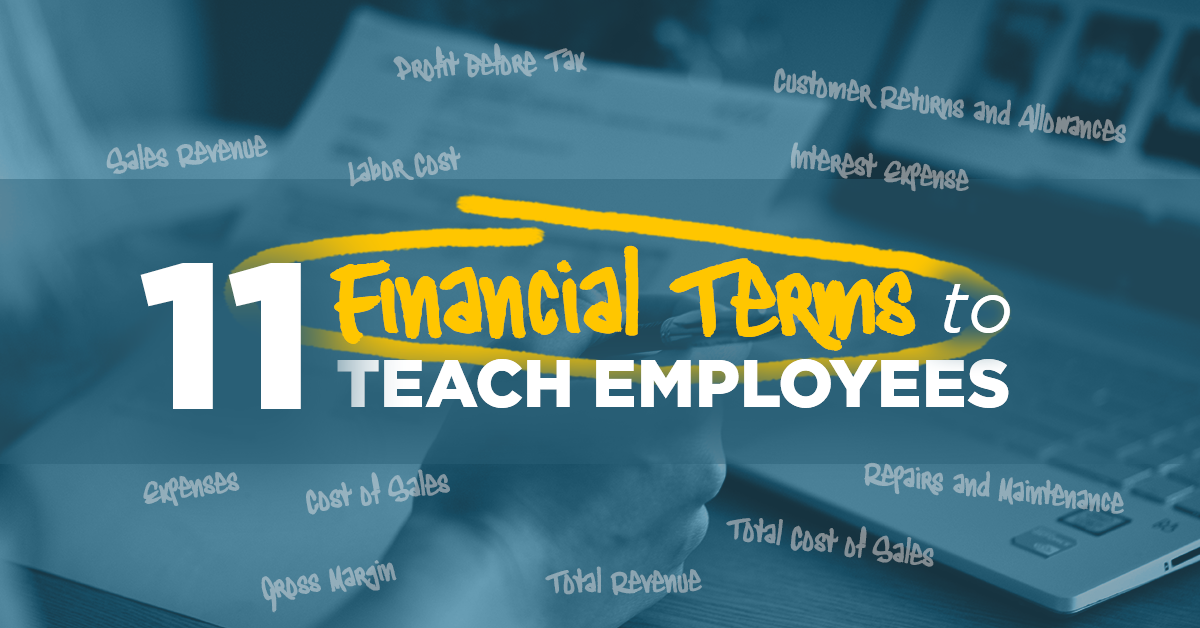My GGOB Story The year was 2011, and I was living it up as a young single 20-something in Springfield, MO. I was a proud community college graduate holding an associates degree in ‘electronic media production’ with a slight obsession with attending large-scale music festivals. You know the ones, Coachella, Bonnaroo, The HangOut Music Fest. I lived for them and I was always planning out which one I would attend next, always keeping in mind what my small hourly call center wage would support.
Read More
If your company practices any level of transparency, you know it’s often difficult to help your employees understand all of the financial jargon they will hear on a daily basis. What better time than now to teach your employees basic business financial terms and help them understand what they mean? Use the terms and definitions below to complete this classic training bite to help your team learn 11 basic financial terms in 15-minutes or less.
Read More
“Maybe that meeting was my missed opportunity,” Ron told me, beating himself up a bit. “The fact that the president hadn’t even reported the actual results from the quarter should have alarmed every one of us board members into taking action.” That never would have happened at SRC. We work with our financials in real-time and through our constant huddling, not to mention our bi-annual High-Involvement Planning (HIP) meetings where all of our divisions get together to compare our progress on achieving our plans and forecasts. Paranoia can be good for you—unless you don’t do something about what scares you. You can’t hide from the solution and be successful.
Read More
Why the online streaming company doesn’t believe in keeping secrets from its employees. In his new bestselling book, No Rules Rules, Reed Hastings digs into some of the cultural aspects that make the company he co-founded, Netflix, so successful. In the book, which is framed as a kind of conversation with Erin Meyer, a professor at the INSEAD business school, Hastings writes that one of the cultural values he instilled in Netflix from its very beginning was that there weren’t going to be any secrets. As he puts it, embracing transparency and letting go of secrets—what Netflix calls “sunshining”—brings incredible advantages in terms of building trust and empowering employees to think like owners. What’s interesting is that Hastings acknowledges it’s easy for leaders to say they are pro-transparency. No one goes around saying they want to promote organizational secrecy, right? But why then, he asks, do so many organizations not walk the walk when it comes to sharing things like the company’s financials with their employees?
Read More
Historically, businesses using traditional management styles have been reluctant to give all their employees the knowledge they need to make good business decisions day in and day out as they do their jobs. Open-book management takes a much different approach. It’s all about capturing and sharing both financial and organizational knowledge with every employee and empowering them to use that knowledge to contribute to the long-term success of the organization, as well as their personal success. The benefits of knowledge sharing are numerous, and here are just a few:
Read More
Manager or Monster? Across Emplify’s entire data set, the most common challenges we see are companies promoting top-performing employees into management and then leaving them to their own devices. Unfortunately, when they become managers, they lack support from the business to transform them into truly inspiring leaders. Instead, they fall back on antiquated management styles that sow disengagement among the people they manage. These old styles of management are directly opposed to what I believe it means to lead, and were the driving force behind me writing my new book, Lead Like a Human.
Read More
For owners of closely held, service-based businesses contemplating the total or fractional sales of their companies, attracting and retaining key employees is critical to creating and sustaining value for the long term. A service-based business faces the unique challenge of proving its continuing viability to a potential buyer since its assets are people. A business that can keep its best employees during and following a transaction will be much more likely to keep its customers, thus retaining its value.
Read More
Let's face it, the most important thing in business is CASH. Cash is the oxygen of every business. When you have cash, your business can breathe. Cash enables it to survive and prosper. While businesses can survive for a short time without growing in sales or profits, without cash it simply will not survive. This is why the inflow and outflow of cash must be carefully watched and managed.
Read More
For more than 25 years, we’ve helped thousands of companies implement open-book management to its fullest capacity. Along the way, we’ve developed a list of common mistakes companies make while using transparency and open-book management in their organization. If you think you are not executing open-book management correctly, or are not seeing the results you expected, then you may be making one of these four common errors:
Read More
Employee engagement is a hot topic as business owners are focusing on attracting and retaining top talent. How are you going to invest in your employees this year and keep them engaged? As an employer, are you up to par with what your staff is looking for? According to this survey from CareerBuilder, employees are saying they want to get ahead in their career and utilize more training, but aren't offered educational opportunities to learn the skills needed to do so: Only 32% of employees are satisfied with the opportunities for career advancement. 58% think their company does not offer enough opportunities to learn new skills and help them move up in their career. If offered, 73% of employees whose companies do not currently offer educational opportunities or workshops outside of work hours say they would be likely to participate if they were available. Developing Your Workforce is an Investment...Here's Why! Employees want to learn, grow, and contribute to the success of the organization. Have you considered training your employees in these areas?
Read More

.png)

.png)













.png)




-5.png)

